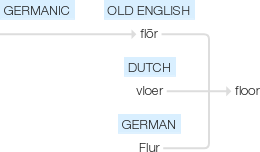Floor
Old English flōr, of Germanic origin; related to Dutch vloer and German Flur .
wiktionary
From Middle English flor, flore, from Old English flōr(“floor, pavement, ground, bottom”), from Proto-Germanic *flōrō, *flōrô, *flōraz(“flat surface, floor, plain”), from Proto-Indo-European *pleh₂ros(“floor”), from Proto-Indo-European *pleh₂-(“flat”). Cognate with West Frisian flier(“floor”), Dutch vloer(“floor”), German Flur(“ field, floor, entrance hall”), Swedish flor(“floor of a cow stall”), Irish urlár(“floor”), Scottish Gaelic làr(“floor, ground, earth”), Welsh llawr(“floor, ground”), Latin plānus(“level, flat”).
etymonline
floor (n.)
Old English flor "floor, pavement, ground, bottom (of a lake, etc.)," from Proto-Germanic *floruz "floor" (source also of Middle Dutch and Dutch vloer, Old Norse flor "floor," Middle High German vluor "floor, flooring," German Flur "field, meadow"), from PIE *plaros "flat surface" (source also of Welsh llawr "ground"), enlarged from root *pele- (2) "flat; to spread."
Meaning "level of a house" is from 1580s. The figurative sense in legislative assemblies (1774) is in reference to the "floor" where members sit and from which they speak (as opposed to the platform). Spanish suelo "floor" is from Latin solum "bottom, ground, soil;" German Boden is cognate with English bottom (n.). Floor-plan is attested from 1794; floor-board from 1787, floor-lamp from 1886, floor-length (adj.) of dresses is from 1910. The retail store's floor-walker is attested from 1862.
floor (v.)
early 15c., "to furnish with a floor," from floor (n.). Sense of "puzzle, confound" is from 1830, a figurative use, from earlier sense of "knock down to the floor" (1640s). Colloquial floor it "press down hard on the accelerator pedal of a motor vehicle" is by 1986 (compare earlier step on it in the same sense). In mid-19c. English university slang, it meant "do thoroughly and successfully" (1852). Related: Floored; flooring.
